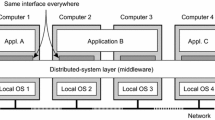Abstract
In this paper we introduce the concept of Agreement Computing, motivate the central role that the concept of agreement plays in open software systems and discuss a number of research challenges that need to be addressed to make the agreement computing vision a reality.
Similar content being viewed by others
References
Arcos JL, Esteva M, Noriega P, Rodríguez JA, Sierra C (2005) Engineering open environments with electronic institutions. Eng Appl Artif Intell 18(2):191–204
Boella G, Noriega P, Pigozzi G, Verhagen H (2009) In: Dagstuhl seminar proceedings 09121: normative multi-agent systems.
Henrik G, Wright V (1963) Norm and action, a logical enquiry. Routledge and Kegan Paul, London
Hermenegildo M, Albert E, López-García P, Puebla G (2005) Abstraction carrying code and resource-awareness. In: Principle and practice of declarative programming. ACM Press, New York
Jennings N, Faratin P, Lomuscio A, Parsons S, Sierra C, Wooldridge M (2001) Automated negotiation: prospects methods and challenges. Group Decis Negot 10(2):199–215
Jøsang A, Ismail R, Boyd C (2007) A survey of trust and reputation systems for online service provision. Decis Support Syst 43(2):618–644
Kalfoglou Y, Schorlemmer M (2003) IF-Map: an ontology-mapping method based on information-flow theory. In: Spaccapietra S, March S, Aberer K (eds) Journal on data semantics I. Lecture notes in computer science, vol 2800. Springer, Heidelberg, pp 98–127
Ko RKL, Lee SSG, Lee EW (2009) Business process management (bpm) standards: a survey. Bus Process Manag J 15(5):744–791
Kraus S (1997) Negotiation and cooperation in multi-agent environments. Artif Intell 94(1–2):79–97
March J (1996) A preface to understanding how decisions happen in organizations. In: Organizational decision-making, Cambridge University Press, Cambridge
Necula GC, Lee P (1996) Proof-carrying code. Tech rep
Ross A (1968) Directives and norms. Humanities, Atlantic Highlands
Sierra C, Debenham J (2006) Trust and honour in information-based agency. In: Proceedings of the 5th international conference on autonomous agents and multiagent systems. ACM Press, New York, pp 1225–1232
Simon HA Administrative behavior. Free Press (1997)
Vasirani M, Ossowski S (2009) A market-inspired approach to reservation-based urban road traffic management. In: Proceedings of the 8th international conference on autonomous agents and multiagent systems, IFAAMAS, pp. 617–624
Acknowledgements
Research supported by the Agreement Technologies CONSOLIDER project under contract CSD2007-0022 and INGENIO 2010 and by the Agreement Technologies COST Action, IC0801.
Author information
Authors and Affiliations
Corresponding author
Rights and permissions
About this article
Cite this article
Sierra, C., Botti, V. & Ossowski, S. Agreement Computing. Künstl Intell 25, 57–61 (2011). https://doi.org/10.1007/s13218-010-0070-y
Published:
Issue Date:
DOI: https://doi.org/10.1007/s13218-010-0070-y




